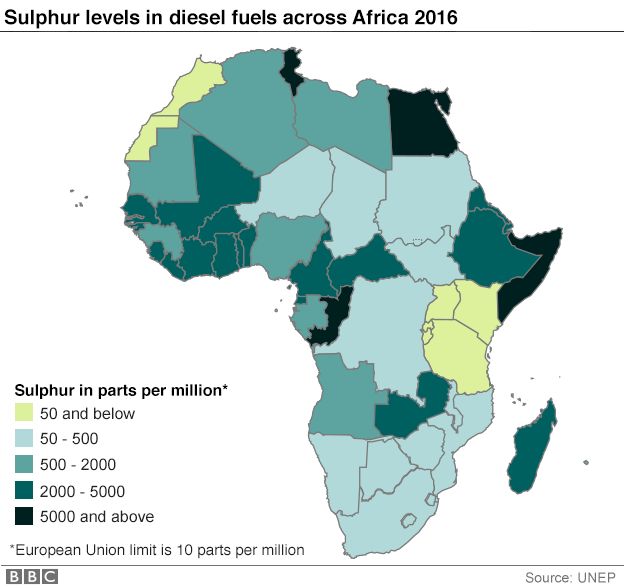Five countries in West Africa have decided to stop importing "dirty fuels" from Europe, the UN Environment Programme says.
A recent report revealed that European companies were exploiting weak regulations in West Africa to export fuels with high levels of sulphur.
Nigeria, Benin, Togo, Ghana, and Cote d'Ivoire agreed on the import ban.
The UN says the move will help more than 250 million people breathe safer and cleaner air.
The sulphur particles emitted by a diesel engine are considered to be a major contributor to air pollution and are ranked by the World Health Organization (WHO) as one of the top global health risks.
It is associated with heart disease, lung cancer and respiratory problems.
In a statement, the UN environment programme says the West African group, in addition to banning the import of dirty fuels, has also agreed to upgrade the operations of their national refineries.
The upgrade, which will concern both public and privately owned refineries, is meant to boost standards in the oil produced in the five countries.
The report into Europe oil exports released in September particularly criticised the Swiss for their links to the African trade in diesel that has toxin levels illegal in Europe.
The study was by the campaign group, Public Eye, which said retailers were exploiting weak regulatory standards.
Erik Solheim, the head of UN Environment Programme, hailed the import ban.
"West Africa is sending a strong message that it is no longer accepting dirty fuels from Europe," Mr Solheim said.
"Their decision to set strict new standards for cleaner, safer fuels and advanced vehicle emission standards shows they are placing the health of their people first," he added

For a long time African countries relied on colonial-era standards, which have only been revised in recent years.
Nigeria's Environment Minister Amina Mohamed said: "For 20 years, Nigeria has not been able to address the vehicle pollution crisis due to the poor fuels we have been importing.
"Today we are taking a huge leap forward - limiting sulphur in fuels from 3,000 parts per million to 50 parts per million."

Nigeria's environment minister said the move would result in major air quality benefits
She said the move would result in major air quality benefits in Nigerian cities and would allow the country to set modern vehicle standards.
The WHO says that pollution is particularly bad in low and middle-income countries.
Latest Stories
-
ORAL is corruption CCTV – Ablakwa
4 minutes -
Rising bond yields point to fiscal challenges for sovereigns – Fitch
13 minutes -
Otto Addo is not the right man for the Black Stars – Osei Palmer
27 minutes -
ORAL operation: I receive threats daily – Okudzeto Ablakwa
32 minutes -
Scrap e-levy, betting taxes, but don’t introduce new ones through back door – Gideon Boako
39 minutes -
Gov’t revokes appointment of MIIF CEO
41 minutes -
Gold, cocoa prices to surge in 2025, but crude oil to tumble – Report
47 minutes -
GPL: Kotoko’s Emmanuel Kotei suffers ACL injury, set to miss rest of the season
47 minutes -
Hollywood actress, Dalyce Curry’s body found burnt in Los Angeles home amid wildfires
57 minutes -
‘Gospel Musician’ arrested with decapitated head
1 hour -
Nii Lante Vanderpuye can ‘break unscrupulous cartel’ as Sports Minister – Boxing Promoter
1 hour -
How production of traditional mat can serve as gateway to economic growth in South Tongu
2 hours -
Africa has a new agrifood systems strategy and accompanying commitments
2 hours -
School Feeding Caterers directed to resume service as schools reopen
3 hours -
The Inconvenient Truth: When We Sink Our Own Ship, We All Drown – A call for Collective Responsibility and Accountability
4 hours

